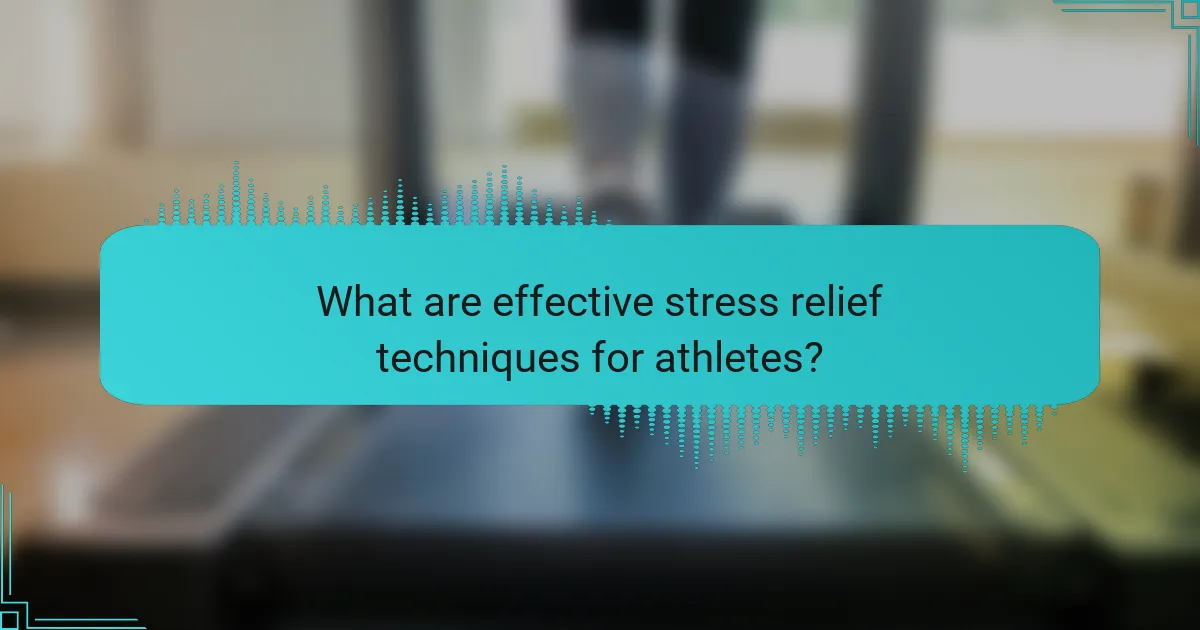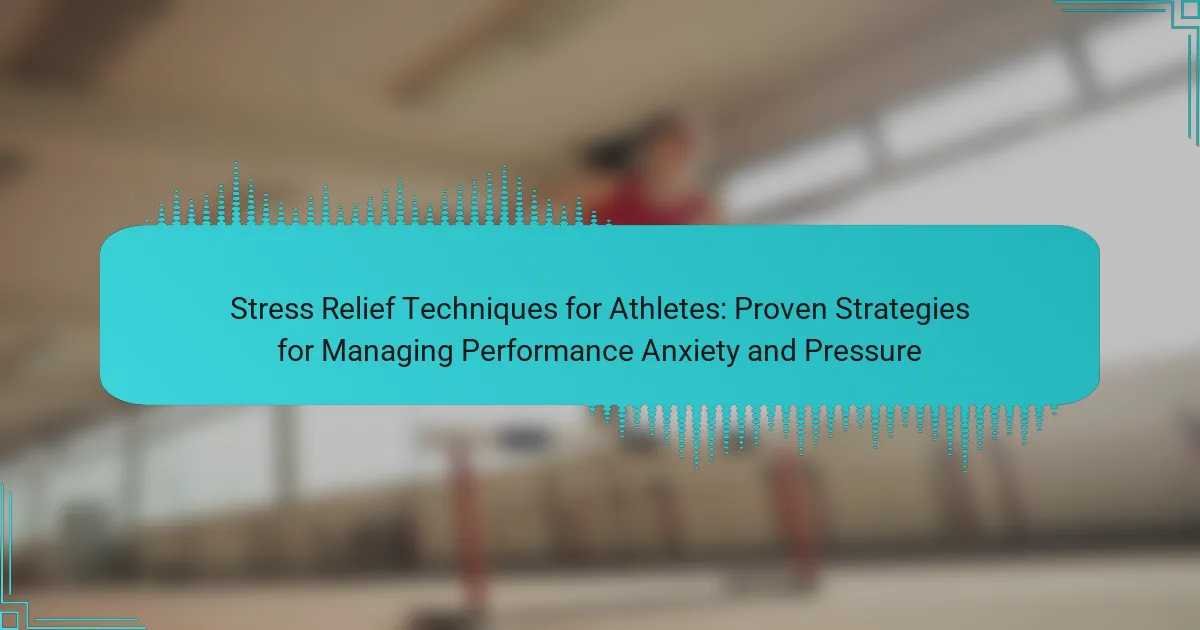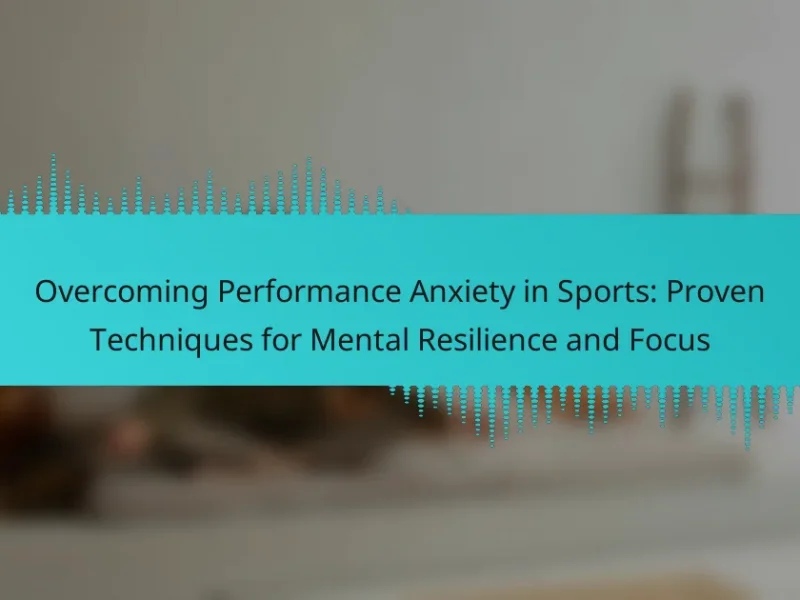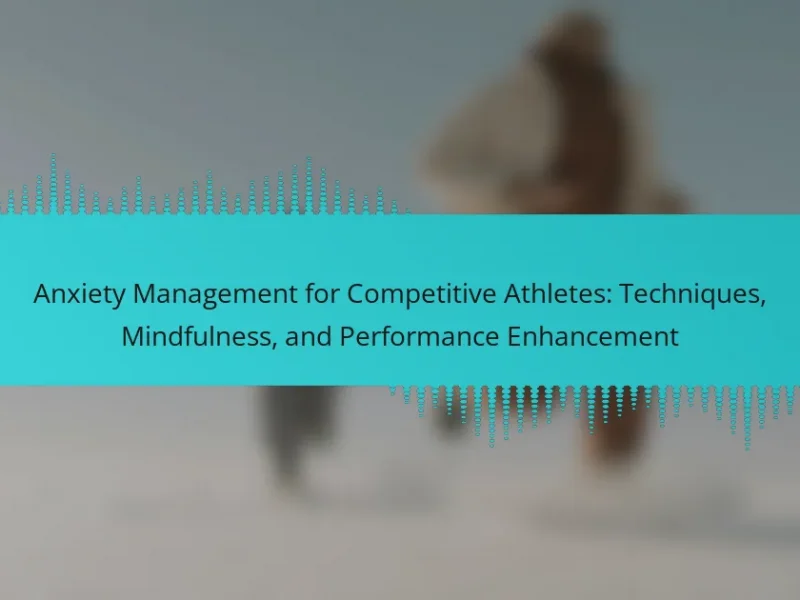Managing performance anxiety is crucial for athletes seeking to enhance their focus and overall performance. Effective stress relief techniques include mindfulness, deep breathing, visualization, and physical activity. These strategies help reduce overwhelming thoughts, promote relaxation, build confidence, and improve mood. Implementing these methods can lead to better performance under pressure.

What are effective stress relief techniques for athletes?
Effective stress relief techniques for athletes include mindfulness, deep breathing, visualization, and physical activity. These methods help manage performance anxiety and enhance focus.
Mindfulness encourages athletes to stay present, reducing overwhelming thoughts. Research indicates that mindfulness practices can lower cortisol levels, aiding stress management.
Deep breathing techniques, such as diaphragmatic breathing, promote relaxation and calm the nervous system. Studies show that controlled breathing can enhance performance by improving focus and reducing anxiety.
Visualization involves mentally rehearsing successful performance scenarios. This technique not only builds confidence but also helps athletes cope with pressure by creating a positive mindset.
Physical activity, including yoga and light exercise, can alleviate stress. Engaging in regular physical activity releases endorphins, which improve mood and reduce feelings of anxiety.
How does performance anxiety impact athletic performance?
Performance anxiety significantly hinders athletic performance by impairing focus and physical execution. Athletes may experience heightened stress, which can lead to decreased confidence and increased muscle tension. Techniques such as deep breathing, visualization, and mindfulness can effectively mitigate these effects, allowing athletes to regain composure and enhance their performance. Research shows that athletes employing these stress relief strategies report improved outcomes and greater mental clarity during competitions.
What are the universal strategies for managing stress in sports?
Effective stress relief techniques for athletes include mindfulness, visualization, and controlled breathing. These strategies help manage performance anxiety and pressure, enhancing focus and resilience.
Mindfulness allows athletes to stay present, reducing anxiety about future performance. Research shows that practicing mindfulness can lower stress levels significantly. Visualization involves mentally rehearsing successful performance, which boosts confidence and reduces fear of failure. Controlled breathing techniques help regulate physiological responses to stress, promoting a calm state of mind.
Incorporating these techniques into daily routines can lead to improved mental health and athletic performance. Athletes who regularly practice these strategies report higher levels of satisfaction and achievement in their sports.
What role does physical conditioning play in stress relief?
Physical conditioning significantly enhances stress relief for athletes by improving physical resilience and mental focus. Regular exercise releases endorphins, which reduce anxiety and elevate mood. Additionally, structured training routines foster a sense of control, mitigating performance anxiety. Incorporating techniques such as yoga or mindfulness can further enhance mental clarity and emotional stability, providing unique benefits for managing stress. Engaging in physical conditioning not only prepares athletes physically but also equips them with effective tools to handle pressure.
How can proper nutrition influence anxiety levels?
Proper nutrition significantly lowers anxiety levels in athletes by providing essential nutrients that support mental health. Balanced diets rich in omega-3 fatty acids, antioxidants, and vitamins can enhance mood and reduce stress. For example, foods like fatty fish, leafy greens, and nuts are known to improve brain function and emotional resilience. Additionally, dehydration can exacerbate anxiety, making adequate fluid intake crucial. Athletes who prioritize nutrition often report better focus and lower performance anxiety, leading to improved outcomes in competitive settings.
What are the benefits of regular sleep for athletes?
Regular sleep significantly enhances athletic performance by improving recovery, focus, and stress management. Adequate sleep reduces cortisol levels, which helps in managing performance anxiety. Studies show that athletes who prioritize sleep experience better reaction times and cognitive function, leading to improved decision-making during competition. Furthermore, consistent sleep patterns contribute to overall mental resilience, allowing athletes to handle pressure more effectively.
What unique techniques can athletes use to cope with pressure?
Athletes can use techniques like visualization, mindfulness, and controlled breathing to cope with pressure. Visualization helps athletes mentally rehearse performance, reducing anxiety. Mindfulness enhances focus and presence, while controlled breathing regulates physiological responses to stress. These unique strategies effectively manage performance anxiety.
How can visualization techniques enhance performance?
Visualization techniques significantly enhance performance by reducing anxiety and improving focus. Athletes who practice visualization can mentally rehearse their actions, leading to increased confidence and better execution during competition. Research indicates that imagery can activate similar brain regions as actual performance, reinforcing muscle memory and enhancing skill retention. Moreover, visualization helps athletes manage stress by creating a mental sanctuary, promoting relaxation and clarity before events. These techniques are vital for athletes aiming to harness their mental strength alongside physical training.
What is the role of goal setting in reducing anxiety?
Goal setting significantly reduces anxiety by providing athletes with clear objectives and a structured path to success. This focus enhances motivation and self-confidence, mitigating feelings of uncertainty. Research shows that setting specific, measurable goals can lead to a 20% decrease in anxiety levels among athletes. Establishing short-term goals creates manageable steps, allowing athletes to track progress and celebrate small achievements, further alleviating pressure.
What rare but effective methods exist for stress management?
Mindfulness meditation is a rare but effective method for stress management in athletes. This technique enhances focus and reduces anxiety, allowing athletes to perform under pressure. Incorporating visualization can further deepen this practice, helping athletes mentally rehearse their performance. Breathing exercises, particularly diaphragmatic breathing, are also beneficial, promoting relaxation and reducing tension. These strategies not only improve mental resilience but also contribute to overall well-being.
How can breathing exercises be tailored for athletes?
Breathing exercises can be customized for athletes by focusing on specific techniques that enhance performance and reduce anxiety. Techniques such as diaphragmatic breathing promote relaxation and oxygen efficiency. Incorporating timed inhalation and exhalation patterns can help athletes manage stress during competitions. Additionally, visualization combined with breathing can enhance focus and confidence. Practicing these exercises regularly builds resilience against performance pressure.
What are the benefits of biofeedback for performance anxiety?
Biofeedback effectively reduces performance anxiety by enhancing self-awareness and control over physiological responses. It teaches athletes to recognize and manage stress indicators, leading to improved focus and confidence. Studies show that biofeedback can lower heart rate and muscle tension, crucial for optimal performance. Additionally, it fosters a sense of empowerment, enabling athletes to approach high-pressure situations with greater resilience.
How can athletes create a personalized stress management plan?
Athletes can create a personalized stress management plan by identifying their unique stress triggers and developing coping strategies. Start by assessing personal stress levels through self-reflection or journaling. Incorporate techniques like mindfulness, breathing exercises, and visualization to manage performance anxiety. Set specific goals for each practice session to maintain focus. Regularly review and adjust the plan based on what works best, ensuring it aligns with individual training schedules and competition demands.
What steps should be included in a stress relief routine?
A stress relief routine for athletes should include physical relaxation techniques, mental visualization, mindfulness practices, and structured breathing exercises. These steps help manage performance anxiety and pressure effectively.
1. Physical Relaxation Techniques: Engage in progressive muscle relaxation or gentle stretching to release tension.
2. Mental Visualization: Use imagery to envision successful performance, enhancing confidence and reducing anxiety.
3. Mindfulness Practices: Incorporate meditation or focused attention exercises to promote present-moment awareness.
4. Structured Breathing Exercises: Practice deep breathing or diaphragmatic breathing to calm the nervous system and improve focus.
What common mistakes do athletes make in managing stress?
Athletes often make critical mistakes in stress management, such as neglecting recovery time, underestimating the impact of mental fatigue, and failing to communicate their feelings. These oversights can exacerbate performance anxiety and pressure. Additionally, many athletes do not utilize proven stress relief techniques like mindfulness and visualization, which are essential for maintaining focus and composure. Recognizing these pitfalls allows athletes to adopt more effective strategies, ultimately enhancing their performance and well-being.
What expert tips can enhance stress relief techniques for athletes?
Incorporating expert tips can significantly enhance stress relief techniques for athletes. Focus on mindfulness practices, such as meditation and breathing exercises, to cultivate awareness and reduce anxiety. Establish a consistent routine that includes physical activity and relaxation techniques, which can improve overall mental health. Utilize visualization strategies to mentally prepare for competition, creating a positive mindset. Finally, seek social support from coaches and teammates to foster a sense of community and alleviate pressure.


